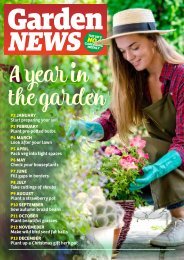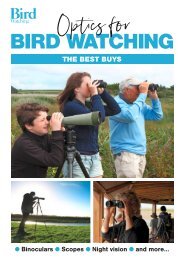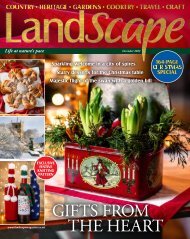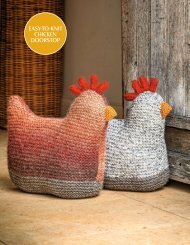Create successful ePaper yourself
Turn your PDF publications into a flip-book with our unique Google optimized e-Paper software.
MAY<br />
This is a busy month for any gardener,<br />
with frosts well and truly gone, and warm<br />
daytime temperatures.<br />
l Prepare your beds for planting flowers,<br />
shrubs and vegetables by digging them over,<br />
weeding and adding compost if necessary.<br />
This will have side benefits for garden birds that<br />
eat worms, as they’ll be easier to find. Robins<br />
are the best example, of course – their<br />
behaviour around gardeners actually mimics<br />
what they would do with Wild Boar as the large<br />
mammals turn over earth.<br />
l Try planting perennial flowers, which return<br />
year after year, to add colour and to attract<br />
insects. If you haven’t planted<br />
wild flower seed (some species<br />
need to be sown as early as the<br />
previous October), don’t worry<br />
– pot-grown wild flowers are<br />
available at many garden<br />
centres. Make sure you<br />
water them in well, and<br />
keep them moist.<br />
l Prune springflowering<br />
shrubs such<br />
as Forsythia after they<br />
have flowered.<br />
l Plant herbs, herbaceous<br />
plants, and container-grown<br />
shrubs, and make up your hanging baskets.<br />
l Sow salad vegetables, cabbages, etc.,<br />
outdoors. If you have to take measures to<br />
prevent birds from eating too many<br />
(Woodpigeons can be very fond<br />
of peas, for example), don’t use<br />
netting that the birds could get<br />
their feet tangled in – 4cm<br />
netting should be fine,<br />
stretched taut, and you can also<br />
hang up old CDs to act as<br />
bird-scarers (the artist is<br />
irrelevant, of course, but we found<br />
Cliff Richard’s do the trick).<br />
Wiert Nieuman/Alamy<br />
Tim Gainey/Alamy*<br />
Anne Gilbert/Alamy*<br />
Arterra Picture Library; Rob James*/Alamy<br />
JUNE<br />
This is when you may start to notice insect 'pests' such as greenfly<br />
and other aphids on some plants.<br />
You need to avoid spraying them, as pesticides kill 'helpful'<br />
insects such as ladybirds (which are themselves great<br />
controllers of aphids and similar pests), and could<br />
also harm those bird species such as Blue Tits<br />
which feed on the tiny insects.<br />
If such pests are really damaging your plants,<br />
try washing them off with a dilute solution of<br />
washing-up liquid. You may need to repeat this<br />
from time to time, but it is a wildlife-friendly solution.<br />
JULY<br />
Water is vital for the summer garden, of<br />
course. Pot plants will need to be watered<br />
regularly – daily if there’s no rain – and<br />
borders will also need water, so this might be<br />
the time to invest in a rainwater butt. With<br />
water an increasingly precious resource, it<br />
will enable you to keep your garden green<br />
without guilt. Remember, though, to fit<br />
a lid (if your butt fills from a drainpipe), or<br />
a fine mesh, to prevent small animals and<br />
birds from becoming trapped in it.<br />
Looking further ahead, consider planting<br />
Mediterranean plants such as Lavender,<br />
Cistus, Helianthemum (Rock Rose),<br />
Rosemary, Spanish Broom, Salvias, Lambs'<br />
Ears, and Aubrietia – these are used to a<br />
drier climate, and cope well with drought<br />
and generally lower rainfall.<br />
Apply mulch to borders after rain – this<br />
helps retain moisture.<br />
LAMBS' EARS<br />
AUBRIETA<br />
SPANISH BROOM<br />
HELIANTHEMUM<br />
T-B: Christopher Burrows*; Geoff Smith; Wieslaw Jarek; flowerphotos* all Alamy<br />
Arcaid Images/Alamy*<br />
6 Create the Perfect Bird Garden <strong>2018</strong>

















